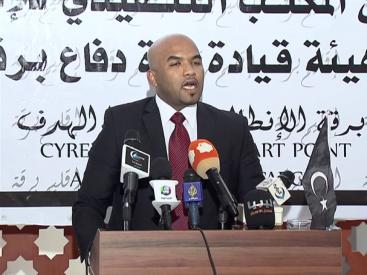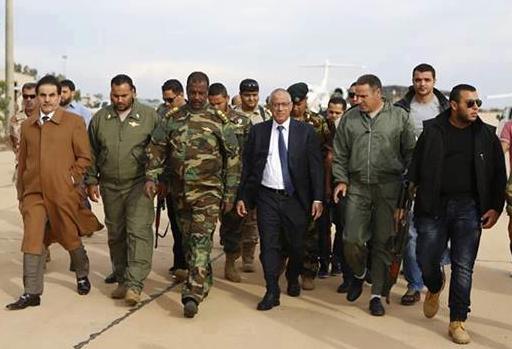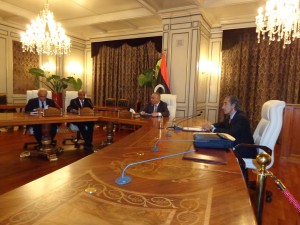Libya = Chaosistan ?
Libya Herald......
Zeidan floats idea to buy up illegally-held arms with outside help
By Ahmed Elumami.
Tripoli, 11 November 2013:
The government may need international help to organise the purchase and collection of weapons not held by the police, army and affiliated units, prime minister Ali Zeidan has said.
Zeidan proposed yesterday at his press conference that Libya needed to take advantage of international experience, to set up a programme to buy up all illegally-held arms in the country.
Zeidan said that if the GNC approved his plan, the government would seek to set up a procedure whereby “arbitrators” would receive surrendered weapons from individuals and organisations, who might have been reluctant to hand over their arms to other Libyans.
He did not spell out how this would work, but he may have been thinking of the system that worked in Northern Ireland, after the Good Friday peace accord, whereby the Irish Republican Army put their weapons “beyond use” under the gaze of independent observers led by a US politician Senator George Mitchell.
Zeidan emphasised however that he was merely floating this as an idea for debate. He was not proposing that the government should decide on such a move without consultation.
Jadhran launches new Cyrenaican oil company, mocks Zeidan’s ten-day deadline
By Ahmed Elumami.

Jadhran scorns government’s ten-day deadline
Tripoli, 11 November 2013:
The self-styled head of the Cyrenaican Political Bureau, Ibrahim Jadhran went on TV within hours of PM Ali Zeidan’s ultimatum giving ten days to end oil export blockades, and he mocked the prime minister over his kidnapping and blasted the GNC for its failures.
The former eastern commander of the Petroleum Facilities Guard, who has be instrumental in the blockading of all the eastern export terminals, said: “ What do we expect from a government whose head is kidnapped from his bedroom and from a Congress that has not paid attention to the demands of Libyans? “
Speaking yesterday from Ajdabia, alongside “the prime minister of Cyrenaica” Abdraba Abdulhameed Al-Barasi, Jadhran also announced the formation of Cyrenaica’s own oil and gas vehicle, the Libyan Oil and Gas Corporation. He said that the new organisation would have a temporary home in Tobruk, before moving to Benghazi at a later date.
He named Saleh Musmari as head of the new business. He also said that one of the first things that the Libyan Oil and Gas Corporation would do would be to instal proper metering, which the NOC had admitted had failed on most of the export systems.
“We will not make that same mistake”, said Jadhran, adding that flow counters would be located and installed, so that the LOGC could “start selling oil with transparency and justice”.
The state should have monopoly on use of force – Zeidan
By Sami Zaptia.
Tripoli, 11 November 2013:
At yesterday’s press conference, Prime Minister Ali Zeidan said that if Libyans want a civilian state they should give up all weapons exclusively to the state and the official police and army.
He said that the outbreak of violence last Thursday and Friday were the “ultimate proof that weapons outside official security forces were a big danger”.
Zeidan was speaking after fighting broke out on Tripoli’s central seafront promenade between two sets of thuwar (ex-fighters) from Suq il Juma and Misrata, increasingly seen as militias by the general public,
The clashes had left two dead and 29 injured and Misrata City Council had moved quickly to distance itself from the Tripoli-based armed group.
Referring to the deaths and injuries, Zeidan said that these weapons were a danger even to the armed groups themselves. The Prime Minister condemned the indiscriminate firing of “heavy arms” right in the heart of the capital, on a scale not witnessed since the end of the 2011 conflict.
This incident portrayed the worse picture of Libya, Zeidan added.
Why and what was the reason for the fighting, Zeidan asked, without answering his own question.
Implicitly responding to widespread criticism by the general public with regard to the absence of the government during the weekend troubles, Zeidan said it was “easy sitting at home and being critical”.
Surprisingly, he insisted that government security agencies were present during the incident, although given the minor damage caused to buildings ranging from Al-Waddan hotel near the flyover, to the Ministry of Planning, to the Radisson hotel and up to the Foreign Ministry over about three hours – it is difficult to believe that government agencies had any effective presence.
Zeidan blamed the fighting on “the situation” his government found itself in. He said the weapons made available by the revolution were “kept by tribes and cities” who wanted to keep their weapons to “defend the revolution”.
However, he said that it was those who hold weapons are Libyans and it is they that are “threatening the peace and security”.
Again implicitly referring to widespread public criticism of inaction and failure to use force as a deterrent against those who use weapons to disturb the peace and security, Zeidan asked: Do you want us to shoot at them?
Zeidan said that his government was not installed with weapons.” We are civilians”, he stressed. If we want a civilian state we should give up all weapons exclusively to the state and the official police and army.
There are some who want to stop the creation of the state, the police and the army, Zeidan reiterated. They want weapons to stay with the tribes and cities, he explained.
Zeidan visits Benghazi
By Ahmed Elumami.

Prime Minister Ali Zeidan with Commander of Benghazi Special Forces, Wanis Bukhamada, (left) and Colonel Abd Nasser Bousnina (right) (Photo: Government’s official Facebook page)
Tripoli, 11 November 2013:
Prime Minister Ali Zeidan arrived at Benghazi’s Benina Airport this morning as part of an unannounced visit to discuss the security crisis in the east of the country.
Discussions were predominantly between Zeidan, the Commander of Benghazi Special Forces Wanis Bukhamada and the Commander of Benina Air Defence helicopter squadron Abd Nasser Bousnina, who thwarted a kidnap attempt on Friday night.
Zeidan arrived shortly after 9 am and discussions were still ongoing at 2 pm, spokesman for Benghazi Joint Security Room (BJSR), Abdullah Zaidi, told the Libya Herald.
The meeting focused on the latest developments related to the current security crisis in Benghazi, Zaidi said, and reviewing the most urgent action needed for the maintenance of security.
“Our demands are clear and known in advance,” Zaidi said. “We need to be able to rely on the army and police to provide security and safety, which have become the biggest concern for the people of Benghazi.”
The meeting was also attended by a number of BJSR officers, Culture Minister Habib Al-Amin and a number of Benghazi elders and members of civil society organisations.
Government is determined to stand up for legitimacy – Zeidan
By Sami Zaptia.

Prime Minister Ali Zeidan said that he was determined to stand up to those attempting to terrorize the people of Libya in Benghazi (Photo: Sami Zaptia).
Tripoli, 11 November 2013:
At yesterday’s press conference, Prime Minister Ali Zeidan hit back at those hoping to destabilize Libya with their terror campaign against the people of Benghazi.
Zeidan said that the continued assassinations in Benghazi were the “ultimate proof ” that particular groups or individuals were “challenging” the public and the government.
Nevertheless, Zeidan said that he and his government were determined to stand up for legitimacy as represented in the democratically elected GNC and its chosen government.
The Prime Minister was making his comments in a week when a Municipal Guard officer was killed, the Jabal Akhdar Prosecutor General was assassinated and two Crime Prevention Department security officials were all killed in the east of Libya – just in the last three days.
Russia Today .....
http://rt.com/news/libya-separatist-oil-company-514/
A separatist Libyan region has announced an establishment of an independent oil company after taking over several commercial sea ports. As Tripoli struggles to regain control, the PM has warned of foreign intervention unless central govt rule is restored.
On Monday, protesters told staff at Mellitah port, in Libya's north, to cease gas exports to Italy as parliament and government had not given in to demands for wider political rights.
"We tried to convince them not to close the pipeline, but it's closed now," head of the local oil workers' union, Munir Abu Saud, told Reuters.
Libya’s Prime Minister Ali Zeidan said on Sunday that the demands were intolerable. “The international community cannot tolerate a state in the middle of the Mediterranean that is a source of violence, terrorism and murder,” he said.
Citing the Iraq experience, he warned Libyans of a possible “intervention of foreign occupation forces” in order to protect civilians under Chapter VII of the UN Charter.
To avoid such a scenario, “the people must take to the streets” and “support the building up of the army and police,” as the government needs more time to create a professionally trained security force, the Prime Minister said.
The Prime Minister’s warning comes as Libya slipped into a new string of deadly attacks in Tripoli and the Eastern part of the country over the last week.
In the latest display of lawlessness since colonel Gaddafi‘s assassination and foreign invasion, an autonomy movement has seized several ports and plans to sell crude oil, as Tripoli is trying to regain the facility.
In the eastern Cyrenaica region, militias and local tribal leaders are trying to create a loose federal system of government, sharing power with Fezzan, the south western region of Libya.
The prime minister of the self-proclaimed Cyrenaica government made a live announcement on nationwide television claiming that an oil firm has been set up in Tobruk next to the Hariga port where the locals on Friday did refused to allow a government-chartered tanker to load 600,000 barrels of oil bound for Italy.
“We have formed a firm called Libya Oil and Gas Corp,” Abd-Rabbo al Barassi told Reuters by phone.“We will wait for a response from Tripoli and Fezzan and hope for an understanding with them. Then the firm will sell oil and we will keep the regional share of Tripoli and Fezzan without using it,” Barassi said.
The creation of a separatist oil firm that will be responsible for oil exports was undertaken alongside a plan to set up an eastern central bank as a mix of militias and tribes seek more autonomy.
To avoid such a scenario, “the people must take to the streets” and “support the building up of the army and police,” as the government needs more time to create a professionally trained security force, the Prime Minister said.
The Prime Minister’s warning comes as Libya slipped into a new string of deadly attacks in Tripoli and the Eastern part of the country over the last week.
In the latest display of lawlessness since colonel Gaddafi‘s assassination and foreign invasion, an autonomy movement has seized several ports and plans to sell crude oil, as Tripoli is trying to regain the facility.
In the eastern Cyrenaica region, militias and local tribal leaders are trying to create a loose federal system of government, sharing power with Fezzan, the south western region of Libya.
The prime minister of the self-proclaimed Cyrenaica government made a live announcement on nationwide television claiming that an oil firm has been set up in Tobruk next to the Hariga port where the locals on Friday did refused to allow a government-chartered tanker to load 600,000 barrels of oil bound for Italy.
“We have formed a firm called Libya Oil and Gas Corp,” Abd-Rabbo al Barassi told Reuters by phone.“We will wait for a response from Tripoli and Fezzan and hope for an understanding with them. Then the firm will sell oil and we will keep the regional share of Tripoli and Fezzan without using it,” Barassi said.
The creation of a separatist oil firm that will be responsible for oil exports was undertaken alongside a plan to set up an eastern central bank as a mix of militias and tribes seek more autonomy.
Earlier Zeidan gave the rebels maximum of 10 days to clear the oil facilities. “Otherwise we will take measures,” he said.
Speaking about the chaos in Libya, the prime minister said that the country may find it difficult to cover its budget expenditures as oil output has dropped to a fraction of its original of 1.25 million barrels a day.
“The budget is based on the assumption that oil revenues flow for the [full] year,” he said. “From next or the following month, there could be a problem covering expenditure. Due to the oil [export] delays the state is ... facing a deficit.”
Earlier the Finance Minister said that the preparation of the 2014 budget will be delayed as the government is struggling to collect information from an increasing number of authorities with separate budgets.
In the meantime, protesters to the west of Tripoli have stopped the oil exports from the Mellitah terminal and now are threatening to stop gas exports as well, demanding more political rights. The blockade of Mellitah which is run in cooperation by Italy's ENI and Libya's state-owned National Oil Corp (NOC), could force Italy to seek other markets, Zeidan said.
“Italy is now [Libya's] biggest partner. It would be a grave matter if gas exports got blocked because they import between 23 and 25 percent of their oil needs and also import gas. If now gas gets stopped, they might look for other sources and leave us,” Zeidan said.
Speaking about the chaos in Libya, the prime minister said that the country may find it difficult to cover its budget expenditures as oil output has dropped to a fraction of its original of 1.25 million barrels a day.
“The budget is based on the assumption that oil revenues flow for the [full] year,” he said. “From next or the following month, there could be a problem covering expenditure. Due to the oil [export] delays the state is ... facing a deficit.”
Earlier the Finance Minister said that the preparation of the 2014 budget will be delayed as the government is struggling to collect information from an increasing number of authorities with separate budgets.
In the meantime, protesters to the west of Tripoli have stopped the oil exports from the Mellitah terminal and now are threatening to stop gas exports as well, demanding more political rights. The blockade of Mellitah which is run in cooperation by Italy's ENI and Libya's state-owned National Oil Corp (NOC), could force Italy to seek other markets, Zeidan said.
“Italy is now [Libya's] biggest partner. It would be a grave matter if gas exports got blocked because they import between 23 and 25 percent of their oil needs and also import gas. If now gas gets stopped, they might look for other sources and leave us,” Zeidan said.
Mamdouh G. Salameh, oil consultant to World Bank warned of the gravity of the situation, telling RT:"They are not earning any revenue now at this minute from oil exports because there are no oil exports. Sooner or later Libya will stop even paying salaries to the employees, they delay the issuing of the budget because they don’t know what revenue they will be able to get and when they will be able to export oil as before."
On Thursday, Italy's Foreign Minister Emma Bonino told Republica TV that ENI was “weighing closing wells.” When contacted by Reuters, ENI declined to comment.
The Libyan Prime Minister has now given militias until December 31 to join the regular government forces, otherwise threatening to cut off payments to their regional government.
“Libya is part of the world, which cares for it to be a secure spot and not a source of nuisance,” he said. “The world will not leave us to become a part of the Mediterranean that is a source of terrorism, instability and violence.”
The Libyan Prime Minister has now given militias until December 31 to join the regular government forces, otherwise threatening to cut off payments to their regional government.
“Libya is part of the world, which cares for it to be a secure spot and not a source of nuisance,” he said. “The world will not leave us to become a part of the Mediterranean that is a source of terrorism, instability and violence.”


No comments:
Post a Comment